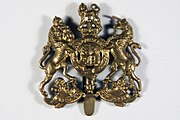Loading AI tools
Military unit From Wikipedia, the free encyclopedia
The General Service Corps (GSC) is a corps of the British Army.
| General Service Corps | |
|---|---|
 Cap Badge of the General Service Corps | |
| Active | 1942– |
| Allegiance | |
| Branch | |
| Role | For specialists, not allocated to a regiment or corps. |
| Beret | Dark blue |
| Insignia | |
| Tactical recognition flash | |
The role of the corps is to provide specialists, who are usually on the Special List or General List.[1] These lists were used in both World Wars for specialists and those not allocated to other regiments or corps.[2] In World War II, they were used for male operatives of the Special Operations Executive (female operatives joined the FANY).[3][4]
The General Service Corps itself was formed in February 1942.[5] From 2 July 1942, army recruits were enlisted in the corps for their first six weeks so that their subsequent posting could take account of their skills and the Army's needs.[6][7] A similar role, holding some recruits pending allocation to their units, continues today.[8][9][10][11] Bermuda Militia Infantry soldiers absorbed into the Bermuda Militia Artillery before demobilisation in 1946 wore the General Service Corps cap badge instead of the Royal Artillery cap badge.[12]

From 1914, for the General List and later the General Service Corps, the cap badge has been the Royal Arms, with variously a king's or a queen's crown, depending on the reigning monarch. It bears the motto of the monarch Dieu et mon droit and the Order of the Garter motto Honi soit qui mal y pense.[13] As a result, a GSC nickname was "Crosse and Blackwell" after the firm whose tins and jar labels had a prominent royal coat of arms.[14] The same capbadge has been used for other British Army regiments and corps for which no unique badge has been authorised, including the Royal Reserve Regiments, the later Royal Garrison Regiment, and the Bermuda Militia Infantry.[15]
Notable members of the General List/General Service Corps include:
The corps is twenty-second in the British Army's order of precedence.[26]
Seamless Wikipedia browsing. On steroids.
Every time you click a link to Wikipedia, Wiktionary or Wikiquote in your browser's search results, it will show the modern Wikiwand interface.
Wikiwand extension is a five stars, simple, with minimum permission required to keep your browsing private, safe and transparent.